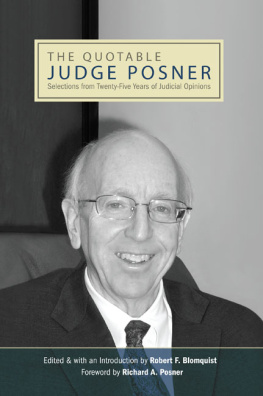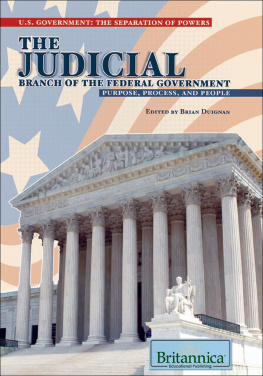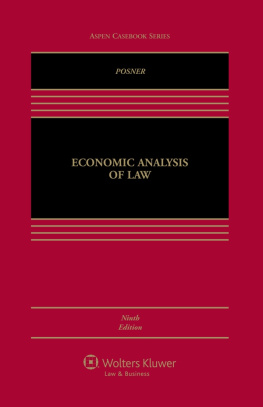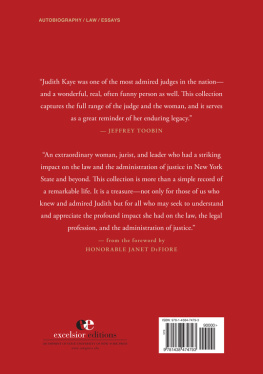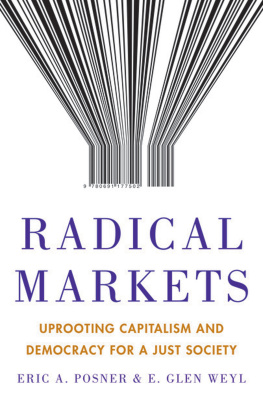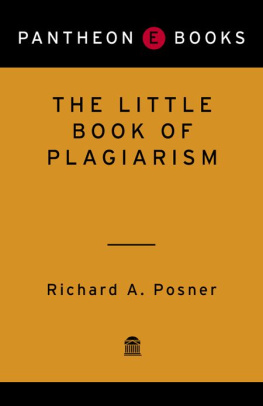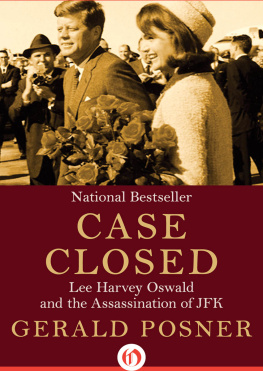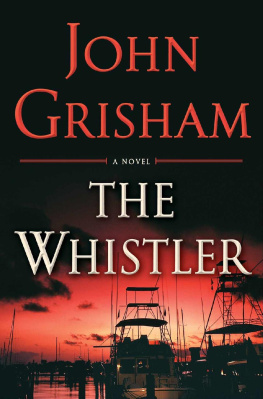Published by State University of New York Press, Albany
2010 State University of New York
All rights reserved
Printed in the United States of America
No part of this book may be used or reproduced in any manner whatsoever without written permission. No part of this book may be stored in a retrieval system or transmitted in any form or by any means including electronic, electrostatic, magnetic tape, mechanical, photocopying, recording, or otherwise without the prior permission in writing of the publisher.
For information, contact State University of New York Press, Albany, NY
www.sunypress.edu
Production by Kelli W. LeRoux
Marketing by Michael Campochiaro
Library of Congress Cataloging-in-Publication Data
Posner, Richard A.
The quotable Judge Posner : selections from twenty-five years of judicial opinions / edited and with an introduction by Robert F. Blomquist ; foreword by Richard A. Posner.
p. cm.
Includes bibliographical references and index.
ISBN 978-1-4384-3063-8 (hardcover : alk. paper)
ISBN 978-1-4384-3064-5 (pbk. : alk. paper)
1. Judicial opinionsUnited States. I. Blomquist, Robert F. II. Title.
KF213.P67B58 2010
349.73dc22 2009023134
10 9 8 7 6 5 4 3 2 1
Foreword
I have agreed to write this foreword not to echo the too-generous praise of my judicial opinions that Professor Blomquist gives in his introduction, or even to thank him for the enormous labor he has undertaken in preparing this book, but instead to explain why I write my judicial opinions in the way I dofor Professor Blomquist is correct that they are distinctive. More precisely, they are distinctive in today's judicial culture. I want to discuss that culture briefly and explain why I have tried to depart from it.
The typical appellate opinion nowadays is more formalistic or legalistic than the typical opinion of a half century ago. The change is related to the increased role of law clerks in the judicial system and to the heavier caseloads of the appellate courts. The two phenomena are connected. Heavier caseloads beget more clerks (except in the Supreme Court, where, curiously, the increase in law clerks is correlated with a decrease in caseload) and require more delegation of judicial work to them. Most judges have found that opinion writing is a delegable part of the judicial workload. Not that they give the law clerks carte blanche or fail to wield a strong supervising and editing arm, as well as retaining full control of the bottom line (the outcome of the appeal). But few of them anymore write the first draft, and relatively few rewrite the clerk's draft so thoroughly that it is as if the clerk had not been involved except as research assistant and source of ideas.
Law clerks perforce are legalists. What they bring to their clerks' jobs is mainly what they learned in law school; and what they learnedin part because it was what they expected that they would learnwas the conventional sort of legal analysis that consists of fitting the facts of a case to a legal rule usually found in previous cases. Often there are two or more rival candidates to be the rule that governs the case, and then the conventional legal analyst asks whether the case at hand is more analogous to cases governed by one of the rival rules or more analogous to cases governed by another. This reasoning process, often rather arbitrary, is given a patina of objectivity by heavy use of legal jargon and dense citation of cases and of other orthodox legal materials.
In my experience, this style of opinion writing does not reflect the thinking process of judges in difficult cases, which are surprisingly frequent even in the work of the lower courts. The legalistic reasoning process that I describe (too briefly) in the preceding paragraph is more a form of rhetoric than a method of actually deciding a close case. It cannot close the gap between the facts and the outcome in such a case. To call a case close is really to say that both sides can make respectable but inconclusive legalistic arguments, and when that is true, the judge must look beyond the orthodox legal materials to decide the outcome.
I try in my opinions to bring to the surface the considerations that move judges in close cases. Not that all the cases in which I write an opinion are close. Far from it. But often a case looks close because there are vaguely stated legal rules or principles that enable both sides to make colorable arguments, though one side's arguments may be pretty obviously wrong, even absurd. In such cases it is useful for the judges to try to trim the vaguely stated rule or principle by explaining the purpose behind it, because purpose is often the best guide to the meaning and scope of a legal rule. Lawyers like to think that they use language with precision. They do not. They use it with care, which is something different. Ambiguity abounds in American law. I try where possible to dispel ambiguity by digging beneath the semantic surface of a rule for the practical considerations that motivated its adoption, and then by restating the rule in a modern idiom and with a clear indication of the rule's limits as derived from its purpose. At bottom, American law, like American political culture generally, is pragmatic. Most legal rules, provided they are not allowed to expand to their outer interpretive limits, make a certain practical sense. Finding and exhibiting that sense is a particular goal of my opinion writing.
To read a judicial opinion written by a law clerk is often like navigating a muddy, tumid stream. A typical such opinion might start with a detailed recitation of facts, many of them irrelevant as well as uninteresting (dates, for example, where nothing turns on the date of a particular occurrence). At the same time, much is left out that is both interesting and important and could be found in a five-minute search of the Web. Often a case involves mysterious business practices, arcane foreign customs (in asylum cases, for example), rare medical mishaps, and other esoterica that the lawyers do not bother to explain to the judgesmaybe because the lawyers think we know more than we do or because they think we would be offended to be spoon-fed background facts (we would not)and that the judges do not think to investigate on their own. After the facts at once too many and too few comes often a summary of the lower courts' opinion and of the parties' contentions, and a statement of the standard of review, which have many gradations finer than judges actually can discern in a case. And then at long last comes the analysis, often well concealed in quotations from previous cases (quotations often taken out of context, in defiance of Oliver Wendell Holmes's dictum that general propositions do not decide concrete cases), in bromides that do not describe actual judicial practice (such as we start from the words of the statutewhich we never do; we start from some general sense of what the statute is about), in strings of citations that would not bear careful scrutiny, in vacuous appeals to justice or fairness or plain meaning, or made-up legislative intent.
The aim is to make the outcome seem to follow ineluctably from prior authoritative pronouncements with no addition from the writer of the judicial opinion, who pretends merely to have displayed the authorities that make the outcome an inevitability. I try, in contrast, to translate legal jargon into ordinary English (that is not always possible); to avoid the standard judicial clichs (such as

